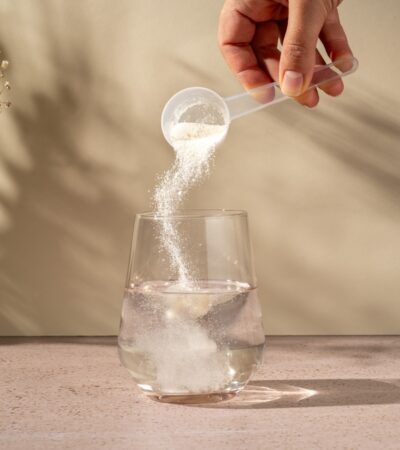Feeling over emotional or irritable for no reason; bloated and craving ridiculous amounts of chocolate – it’s not you, it’s your hormones! Katie Pande, medical herbalist at Pukka Herbs explains…
We are all familiar with the term ‘PMT’ or pre-menstrual tension; this is just one indicator of how us we women can feel when hormones can become even slightly tipped out of balance.
For women to maintain a healthy hormonal balance determines on our ability to endure a pain-free, hassle-free menstrual cycle. Essentially, it is vital to core wellbeing.
In a recent survey carried out by Pukka Herbs, on the subject of PMS and how it effects women’s health, they discovered that 76% of women said they suffered with erratic mood swings and felt irritable or angry before their period; 62% said they suffered with bloating and 61% were troubled with appetite changes, food cravings and fatigue.
What are hormones?
Hormones are chemicals that send messages to other parts of our body or brain, telling them how to act. They include:
Thyroid hormones – govern our metabolism
Insulin – tells our cells to take up sugars from our blood.
Oestrogen, progesterone and testosterone (sex hormones) – govern fertility, the development of sexual characteristics and (in women) the menstrual cycle.
Hormones affect literally every part of our lives, including whether we feel tired or awake, how hungry we are, our sex drive, our bone density, our body temperature, and whether we feel relaxed or stressed, happy or sad.
How emotions affect our hormonal balance:
During menstruation and the build up to it, levels of oestrogen are low. These low levels of oestrogen also influence low levels of serotonin, dopamine and noradrenalin which can cause feelings of reduced motivation and a general ‘slowing down’ resulting in feeling less mentally alert, more fatigued and less sociable.
As oestrogen levels then begin to rise after menstruation it brings back our physical and mental energy levels, as the levels of serotonin, dopamine and noradrenalin also rise.
What is PMS?
Premenstrual syndrome or PMS is thought to affect up to half of women.
PMS describes a range of symptoms that can be experienced for up to two weeks before your period starts. They can include mental or emotional symptoms such as irritability, mood swings, tearfulness, fatigue or anxiety, and physical symptoms such as bloating, breast swelling, skin breakouts or headaches.
Is PMS ‘normal’?
In fact, some degree of change in our emotions, energy, and wellbeing throughout our monthly cycle is to be expected. The ovaries are linked to the brain, nervous system and endocrine system, so it is no wonder that changes in our emotions can also have significant effects upon our hormonal cycles.
For example, during menstruation and just before, levels of oestrogen are lower than at other times in our cycle. Low levels of oestrogen can affect other hormones and brain chemicals such as serotonin, dopamine and noradrenalin. This can put a dampener on our mood, our energy, our mental alertness and even our desire to socialise. Then, as oestrogen levels then begin to rise after menstruation, our physical and mental energy levels tend to return.
So, perhaps, some degree of what we call PMS is ‘normal’, if symptoms are generally mild.
But contrary to what you might have been told, all this hormonal disharmony is not something you need to ‘put up with’. You can do something about it! So, this in itself provides an understanding for some of the changes in mood and emotions during our menstrual cycle, which is quite reassuring!
Natural health to help
Herbal medicine provides a wealth of options for the support and management of many conditions relating to women’s health.
One key herb that can support women throughout the entirety of their cycle, including menstruation and the menopause is shatavari. In Ayurveda, Shatavari is revered as a primary ‘women’s’ herb. Shatavari is a tonic to the female reproductive system and specifically the uterus. It is a naturally nourishing, cooling and moistening herb that provides the required nourishment and strength to alleviate vaginal dryness, support conception, fertility and a healthy reproductive system. Shatavari contains natural precursors to female sex hormones which help to balance hormonal irregularity, promote conception and improve menstrual symptoms and PMT. Shatavari also stimulates the production of prolactin which enhances the libido. You can find this essential herb in Pukka’s organic Womankind supplement.

What can we do for better hormone balance? Look to your diet.
Avoid sugary foods, refined carbohydrates and processed foods as much as possible. It may be boring, but it’s key for happy hormones! Instead…
Focus on eating ‘real’ foods, including vegetables and whole fruit, beans and lentils, nuts and seeds, whole grains, and good-quality (preferably organic) meat, fish and eggs. Most importantly, aim for a total of seven servings of vegetables and fruit, of which only two should be fruit. ‘Real’ foods provide vitamins, minerals and protein to help your liver break down hormones, and fibre to help you excrete them and prevent constipation. They provide slow-releasing carbohydrates to keep your blood sugar stable.
Avoid those unhealthy fats we mentioned above – margarine, vegetable cooking oils and fats in processed foods. Include plenty of healthy fats: olive oil, avocadoes, raw nuts and seeds, and of course oily fish such as sardines, mackerel and salmon for the omega-3s.
Drink plenty of water to support detoxification and fluid balance in your body. A guideline is 1.5 to 2 litres a day. Herbal and naturally caffeine-free teas count.
Limit or avoid alcohol and caffeine. Alcohol is one of those ‘toxins’ that can burden your liver; and it also depletes vital hormone-balancing nutrients from your body. This doesn’t mean you need to be teetotal, but be aware that drinking several nights a week, or ‘binge drinking’ could be contributing to your symptoms. Caffeine, too, can be a problem, triggering a stress response in your body. Stick to one or two cups a day of coffee or tea, or avoid altogether.
Choose organic where possible – especially when it comes to animal foods. Going organic can help you to avoid some of the hormone-disrupting and liver-burdening chemicals. When it comes to fruit and vegetables, look up the current Environmental Working Group’s ‘Dirty Dozen’ – the 12 types of fruit and veg most contaminated with pesticides – and prioritise buying organic for those.
For more information on Pukka’s Organic Womankind Tea and Supplement, click here.
![]()














